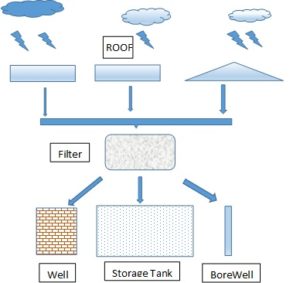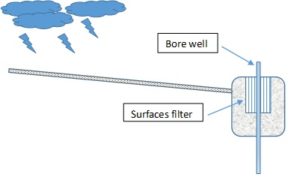Rain water harvesting is a simple technique by which rain water is collected and stored into natural reservoirs or tanks for future use. Also prevention of surface run off of rain water and scientifically infiltrate the rain water in natural subsurface aquifers is another method of rain water conservation.
Capturing the rainwater helps to recharge local aquifers, dry borewells etc. and reduce urban flooding. It also increase ground water table and ensure water availability in water-scarce zones.
Rain water harvesting method can be easily practiced in individual homes, bungalows, residential apartments, parks, commercial offices, hotels, resorts and temples also.
Rain water harvesting can be broadly classified as Rooftop and Surface RWH system.
1] Rooftop Rain Water harvesting system-
In Rooftop RWH, Rain water from Roof tops of Individual homes/bungalows, Residential societies, commercial apartments, industrial sheds etc. is collected, filtered and stored into reservoirs or used to recharge the live bore well.
Typical Roof Top RWH Comprises Of:

1] Roof catchment area.
2] Gutters for sheds
3] Down pipe system.
4] Rain water Filtration and purification system
5] Storage /recharge system such as Tanks, Tube wells, Wells, etc.
2] Surface Rain Water Harvesting system –
This type of RWH system is used to conserve the rain fall on open area/premises.
The rain water is collected at lower gradient of plot area through storm water lines and gutters. It is filtered and stored in underground tanks OR used to recharge the dummy borewell to increase the ground water level. Multimedia or wire mesh screen filters are used to filter out the debris and floating waste.

Benefits-
- Economical simple and proven method.
- Prevent runoff and flood situation.
- Increases water table in surrounding area.
Advantages of implementing rain-water harvesting-
- Reduced Water Bills
- Ecological benefit
- Reduces erosion and flooding around buildings
- An adequate means for Irrigation purpose
- Reduces demand on Ground Water
We offer our expert services in RWH project implementation by following ways.
- RWH project feasibility and assessment report by detailed site survey, consultancy, planning.
- Turnkey RWH project work for existing buildings.
- Supply of various Rain water harvesting filters as per requirements and applications.
Typical Example of RWH water conservation-
Consider Average Rain fall throughout year is = 500 mm.
